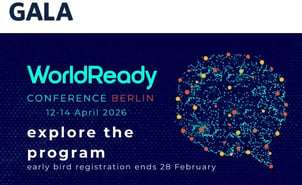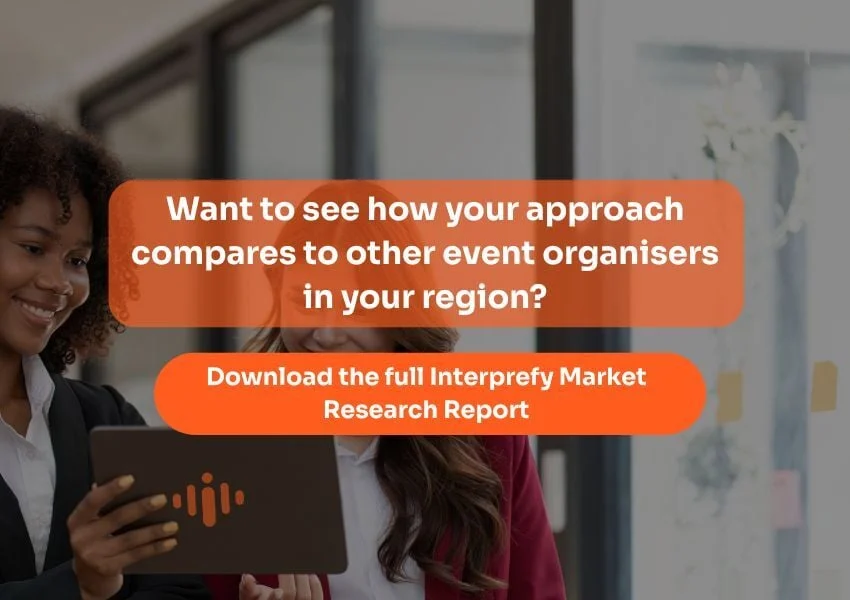As multilingual participation becomes a standard, organisations across Asia-Pacific and the Middle East are increasingly planning meetings and events for diverse, global audiences. Whether coordinating regional webinars, internal town halls, or large-scale conferences, teams are being asked to engage participants across languages and borders. Yet even as formats evolve, one element is often overlooked: language access. When it's missing, the result isn't just a gap in understanding — it can directly affect participation, engagement, and business outcomes.
At Interprefy, we work alongside leading event organisers across the Middle East and APAC, and we see this pattern emerge time and again. Ambitious formats. Brilliant speakers. Expansive reach. But no or little multilingual support. According to our latest research, one in three event organisers in these regions still don’t provide any form of real-time speech translation or interpretation.
In this blog, we’ll explore why that gap exists — and why addressing it is now a strategic imperative for any global-ready organisation.
In this article
- The Business Impact of Multilingual Event Support in APAC and the Middle East
- Common Barriers to Adopting Event Live Translation Services in APAC and Middle East
- Why Remote Simultaneous Interpretation, AI Speech Translation & Live Captions Matter
- The Hidden Cost of Ignoring Multilingual Access
- How Event Organisers in APAC and the Middle East Can Close the Multilingual Gap
The Business Impact of Multilingual Event Support in APAC and the Middle East
It’s easy to underestimate the power of language until it creates a barrier. Imagine trying to contribute in a high-stakes business meeting, follow a keynote at a conference, or connect with partners at a webinar — without understanding the language being spoken.
That’s the reality for many attendees. And our data shows it has consequences.
92% of business event organisers in APAC, and 85% in the Middle East, report feeling frustrated when events lack real-time interpretation or live translation. In other words, they know how it feels to be left out of the conversation. And if event professionals themselves are experiencing this, it’s a clear signal that their audiences are too.
In markets where engagement, trust, and collaboration are essential, failing to provide language access can derail even the most carefully planned event. Whether it’s a leadership roundtable in Singapore or a government forum in Abu Dhabi, multilingual communication is now a business-critical factor.
Common Barriers to Adopting Event Live Translation Services in APAC and Middle East
So if the demand is clear, what’s holding organisers back?
Our research uncovered a few key reasons — and they’re more about awareness and assumptions than lack of will.
First, many organisers still treat English as the default. It’s a legacy approach that worked in the past — but no longer reflects the expectations of international or regional audiences. Across the Gulf, Southeast Asia, and beyond, professionals want to hear and speak in the languages they’re most comfortable with. When that’s not possible, participation drops.
Second, there’s a knowledge gap. We found that nearly half of event organisers across APAC and the Middle East are unfamiliar with Remote Simultaneous Interpretation (RSI) or multilingual captions. That means they’re missing out on solutions that already exist — and are easier to implement than they might think.
And finally, there’s the perception that multilingual services are expensive or technically complex. But the reality today is very different. Tools like RSI and AI-powered live captions are cloud-based, cost-effective, and easy to integrate into virtual, hybrid, and in-person event setups. Whether you're running a team meeting or a trade summit, multilingual support can scale with you now more than ever.
Why Remote Simultaneous Interpretation, AI Speech Translation & Live Captions Matter
In every multilingual event, clear communication is what makes inclusion and reach possible. Whether it’s interpreters working remotely, AI generating instant subtitles, or live captions keeping everyone on the same page — these tools are shaping how we connect across languages.
Re (RSI)
Remote Simultaneous Interpretation (RSI), transforms the way businesses and interpreters approach multilingual events and meetings. For businesses, RSI slashes logistical costs, as interpreters can work from anywhere without travel or on-site equipment, and enables global access to highly qualified specialists for rare or technical language pairs. This flexibility allows organisations to scale their events quickly, adapt to last-minute changes, and broaden their international reach, making high-quality interpretation accessible even for smaller or hybrid events. Additionally, RSI’s remote model boosts sustainability by reducing the carbon emissions associated with interpreter travel, helping organisations support their corporate social responsibility goals.
For interpreters, RSI brings tangible quality-of-life improvements. The remote setup allows interpreters to work from home or any location of their choosing, minimizing burnout, improving work-life balance and opening new markets beyond their local area. They can participate in more events without time lost to travel and gain exposure to a broader range of clients and event types, potentially increasing their earning opportunities and professional growth. RSI is also safer, removing the health risks connected to travel or large physical gatherings.
AI Speech Translation
AI Speech Translation, also known as AI interpretation, offers businesses automated, real-time translation for spoken content across an unlimited number of languages, all at scale and without the incremental costs of traditional human services. This solution is ideal for large, content-heavy events or webinars, as it allows instant, simultaneous translation — enabling every attendee to participate, ask questions, and receive information in their preferred language. Businesses benefit from increased engagement, the ability to unlock new markets, and valuable content analytics, with the added ability to repurpose translated material for future use.
From the perspective of workflow and speed, AI-driven speech translation reduces dependency on interpreter scheduling and makes it possible to support spontaneous or less formal multilingual dialogue. This democratizes access to information and communication for organisations that may not have the budget or time to organise full interpreter support for every language, lowering the barrier for participation in global business or education environments.
Live Captions
Live Captions provide critical accessibility advantages by displaying real-time text on the screen, ensuring that everyone — including Deaf or hard-of-hearing participants and non-native speakers — can follow presentations, discussions, and videos without communication gaps. For organisations, this means compliance with accessibility laws, improved event reach, and a more inclusive environment, all of which contribute to brand reputation and audience satisfaction.
Businesses also gain long-term benefits from captioning, such as searchable text records that support knowledge management, SEO, and content archiving. Live Captions improve the experience for all participants by aiding comprehension in complex, technical, or noisy environments and by making content instantly accessible across any device without additional hardware.
These services aren’t just technical features — they’re strategic assets. They help organisations:
-
Expand reach across markets
-
Improve event satisfaction and engagement
-
Enable real-time understanding in business-critical sessions
-
Demonstrate inclusivity and localisation at a global standard
For event organisers in regions with diverse linguistic audiences — like the UAE, Saudi Arabia, Singapore, or Malaysia — these tools are increasingly part of the baseline expectations.
Here is a summary of their benefits:

| Solution | Business Benefits | Organiser Benefits | Participants Benefits | Interpreter Benefits |
|---|---|---|---|---|
| Remote Simultaneous Interpretation (RSI) | Cost and travel savings, global access to talent, scalability, sustainability, hybrid/virtual event support |
Simplified logistics, scalable for virtual/hybrid/in-person, wider audience reach, reduced carbon footprint |
Real-time language access, interactive engagement, join remotely |
No travel, flexible schedule, broader market access, tech support for quality |
| AI Speech Translation | Scalable instant speech translation, supports many languages, lowers incremental cost, spontaneous multilingual support |
Mass language coverage at low cost, broader market reach |
Real-time translated audio, increased inclusivity |
Supports and complements human interpretation; limited direct role |
| Live Captions | Accessibility compliance, inclusion, improved engagement, searchable event records, SEO benefits |
Meet legal requirements, boost engagement, extend content lifecycle |
Essential for Deaf/HoH, boosts comprehension, multi-device support |
Not applicable (caption-focused) |
The Hidden Cost of Ignoring Multilingual Access
When multilingual communication is missing, attendees don’t just feel excluded — they also struggle to follow, remember, and act on what they hear. That leads to lower retention, fewer questions, and ultimately, less impact for your event.
The cost isn’t just reputational. It affects return on investment, especially when events are part of a larger sales, marketing, or training programme. Without full understanding, messaging gets lost. Attendees disengage. And that makes it harder to meet your goals — whether you're nurturing leads, driving adoption, or building partnerships.
In regions like APAC and the Middle East, where cross-border collaboration is essential and language diversity is a given, ignoring multilingual access becomes a competitive disadvantage.
How Event Organisers in APAC and the Middle East Can Close the Multilingual Gap
The good news? You don’t need a major overhaul to make progress.
Start by identifying the events that would benefit most from multilingual access — think webinars, all-hands meetings, product launches, or regional sales kickoffs. These don’t have to be massive to justify interpretation or captioning. They just have to involve audiences with diverse language needs.
From there, look at scalable solutions. You can begin with AI-powered captions for accessibility, and add human interpretation for high-stakes sessions where nuance matters. A hybrid approach often offers the best balance of cost, scale, and quality.
And importantly, choose a provider that understands your region’s priorities — whether that’s data security, local compliance, or cultural sensitivity. At Interprefy, we work closely with teams across the Middle East and APAC to deliver multilingual experiences that are not only seamless, but also secure, standards-compliant, and tailored to local contexts.
Don’t Wait for Frustration to Speak Louder Than Your Message
The multilingual moment has already arrived — and your audience knows it. If you’re not providing live translation or interpretation, chances are they’re already feeling the friction.
Fortunately, that also means you have an opportunity to stand out. By prioritising language access, you signal that your organisation is ready to meet people where they are. You show that you’re not just broadcasting information — you’re inviting participation.
Whether you’re hosting a regional forum in Doha, a product showcase in Jakarta, or a hybrid event spanning Dubai to Sydney, multilingual communication is what makes global engagement possible.







 More download links
More download links



